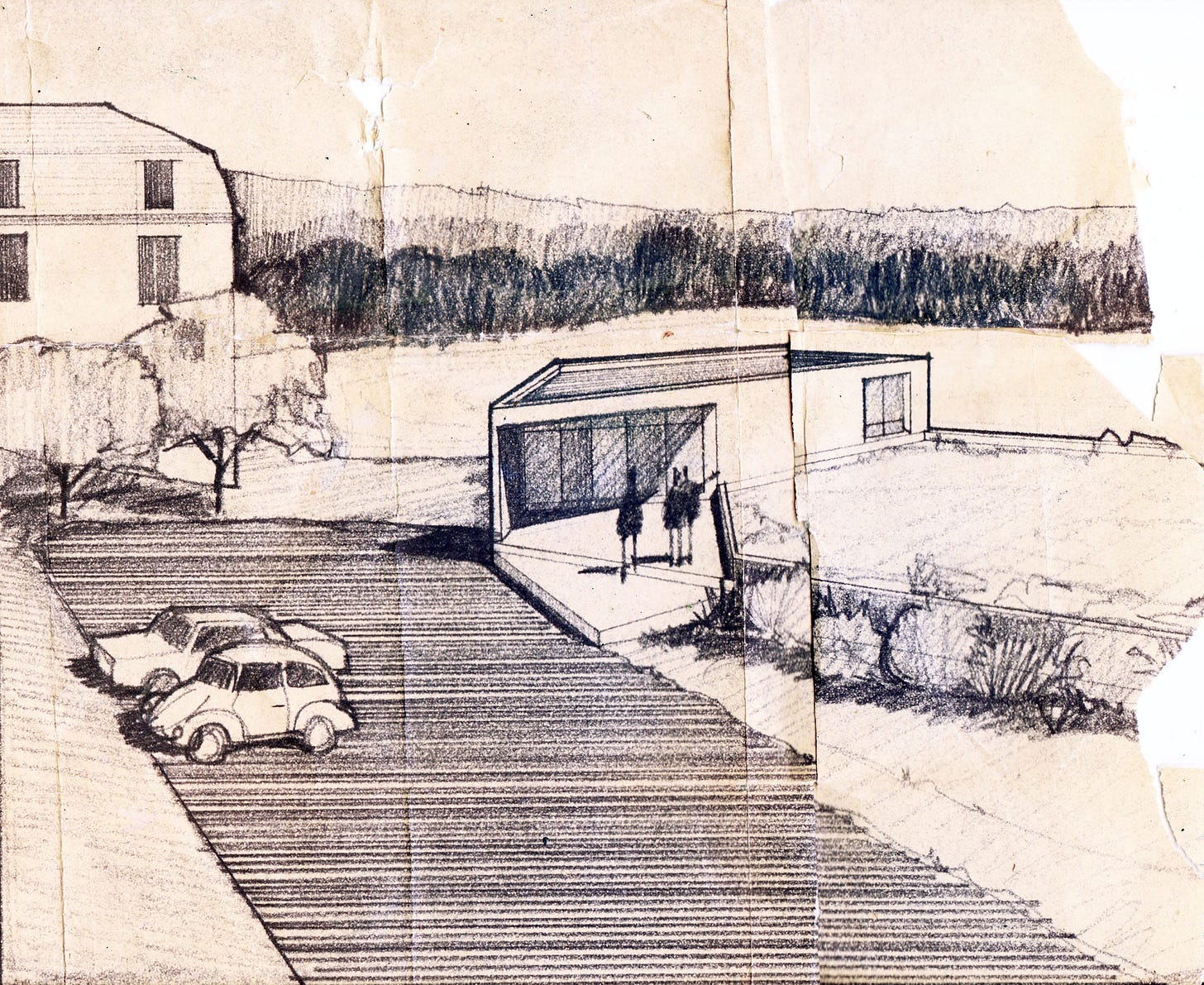
Photo by Egor Litvinov on Unsplash
Health in housing and Maine’s new restricted speech laws
I recently saw an apartment advertised online. The picture shows a long loft with new floors and sheet-rocked walls. There is a single source of natural light coming from a dormer window enclosed between two walls that focus the angle of the light as a narrow beam. There is a stove, refrigerator, sink, and counter space but no kitchen cupboards. The apartment is advertised as a two-bedroom apartment, showing two small rooms, but not completely. The view of the bedrooms is one-sided as if opening a door and looking in but not entering the room. No windows or closets are to be seen, giving the appearance of four walls in windowless rooms. It is 1700.00 a month.
I was raised in an alternate cultural movement influenced by thinkers like Lewis Mumford, who explored community design since Medieval times with great attention to the details of the healthy and functioning aspects of human living, including the importance of exposure to natural sunlight. Mumfords ideas were very popular in Europe after World War II where there was so much rebuilding to do. Now under the new Maine Law, HP 1489, it is forbidden for Maine municipal ordinances to refer to any of the concepts of Mumford’s ideas in Maine municipal ordinances
Taken together, modern form, modern architecture, modern communities are prophetic emergents of a biotechnic society: a society whose productive system and consumptive demands will be directed toward the maximum possible nurture, under ever more adequate material conditions, of the human group, and the maximum possible culture of the human personality. Pg 415
The entire functional development of architecture from the fifteenth century on, as Meyer remarked, is a response to the demand: “More light!” pg 417 Mumford’s Culture of the Cities is available to read online at Monosdkop. org.

Mumford’s thinking informed my Dad’s thinking when he moved to Maine and reconfigured the Industrial Revolution production factory as production as an art form and when he bought our home in East Boothbay and installed a row of three windows where the southern light streamed on the kitchen table where sculptures were created. In the winter the southern light came in at a low angle that was particularly beautiful.
Dad designed a concept for a design and making space and gallery, that he wanted to build on the land we owned by the Mill Pond, a making space where STEAM skills were taught on the job, but the Town would not permit us to build.

Today the refusal by the town to allow Andersen Design to build at our own expense is contextualized by years spent reading Maine’s economic development policy that capitalizes the top of the economy with subsidies and redistributes wealth as living rations for the lower half of the economy, a recipe for a caste system in which those on the bottom are there for perpetuity, never to rise above their station. That explains the attitude of local Town leadership bent on closing down independent grassroots entrepreneurs. What is the psychology that drives this deeply embedded characteristic of Maine culture?
Our home was the oldest in the neighborhood when we moved in in 1958. It was bulldozed into the ground when we lost it and replaced with a structure that, judging by external appearances, does not optimize the quality of light. That is not surprising since the new way of thinking in Maine has devolved away from understanding the health benefits of light to advocating the absence of windows as a benefit!

quote from Conversation generated by my observation that the apartment had practically no natural light.
Today, the housing shortage is being used to convince the public to think in terms of “the least” as in “At least it is better than living in your car!” Because there is a housing shortage, the standard of living for the people can be lowered another notch. They will be grateful merely to have a roof over their head, a bonus for the investor’s class who can reduce their costs by not including windows and cupboards and closets! In a more enlightened era, instead of advertising an apartment with almost no natural light, the ad would feature owner-funded outside window washing, but the new “innovative’ thinking in Maine, advanced by the Maine government, favors eliminating windows and overcrowding housing for the people. The law calls overcrowding a “density bonus” belying what is already clear to anyone familiar with Maine economic development policy, that the government serves the interests of owners and no one, except the people, represents the interest of the people.
New Maine laws written by unelected developers have repealed health standards in housing and transgressed the First Amendment of the US Constitution to forbid municipal ordinances from “referring” to overcrowding or community character.
Amends the fair housing provisions of the Maine Human Rights Act to define the terms “character of a location,” “overcrowding of land” and “concentration of the population” and to prohibit municipalities and government entities from using these criteria to restrict the construction or development of housing accommodations in any area; HP 1489
When did understanding of the health aspects of a building or a community design cease to be a requirement for writing building codes and laws that regulate them? How far have we devolved, and what is the rate of escalation of the downward slide?
In restricting speech that refers to the above criteria the new law prohibits ideas such as those expressed in the writings of Lewis Mumford from being part of the dialogue. Excluding particular ideas and members of the community from participation in community development has long been practiced in Maine but this is the first time I have come across the exclusionary practice codified into law.
Laws that regulate the content of speech are considered by the US Supreme Court to be violations of the First Amendment of the US Constitution. According the The Congressional Research Center, laws that attempt to restrict ideas or viewpoints from the public debate qualify as a violation:
The First Amendment’s Free Speech Clause prohibits the government from suppressing or requiring adherence to particular ideas or messages. U.S. CONST. amend. I. The Supreme Court has recognized that laws restricting or compelling speech based on its content have the potential to expel certain ideas or viewpoints from public debate. The Court typically regards such “content-based laws” as “presumptively unconstitutional.” Reed v. Town of Gilbert, 576 U.S. 155, 163 (2015). source
When I commented about the ad for the apartment, observing that it has almost no natural light, I became the subject of conversation. The others were unified like a cult, all sharing the same beliefs. I was charged with disobeying the rules of Facebook conversations, fictional rules of the cult’s own making, that align with the restrictions on the expression of ideas codified in HP 1489.
Sec. 3. 5 MRSA §4581-A, sub-§5 is enacted to read: Housing development. For any municipality or government entity to restrict the construction or development of housing accommodations in any area based upon criteria that refers to the character of a location, the overcrowding of land or the undue concentration of the population. (emphass mine) Although these words are in the text og HP 1489 , there is as yet no sub-§5 codified in the Maine Revised Stautes.
The fictional rule that I transgressed is that when someone posts an ad for an apartment on Facebook, the only permitted response is applause. Expressing ideas is a violation of restricted speech, a fictional rule extension for the people of that which is codified in Maine statutory law for municipal ordinances. Members of the contingency periodically said “It’s a lovely apartment” in those exact words without variation. No one ever said why the apartment is lovely. Perhaps they were afraid to do so as saying why the apartment qualifies as “lovely” might transgress the rules prohibiting the expression of ideas.
The apartment ad was in my Facebook stream. The stream is where conversation takes place. I am accustomed to thinking about housing and community within organic natural frameworks like that explored and developed by Lewis Mumford. Mumford’s ideas are about creating a better world for humans and the environment. Through my research, I am tuned in to the continual degradation of the living and housing standards of the working-class people that has been ongoing since the state took over central management of the economy in 1976, amplified in the enactment of LD 2003 HP 1489.
The housing crisis is being used to repeal laws protecting the health of renters. There is no one in leadership to stand up for the interests of the renters, leaving only the individual people to stand up for renters’ rights in support of adequate light, space, and kitchen cupboards.
Rule 5.1. Constitutional Challenge to a Statute tells how to file a constitutional question.
Social media is one of the few venues where the people have power. HP 1489 restricts the speech of those who write ordinances but does not yet restrict the speech of the people, but if this trend is not reversed, it will!
Here was an opportunity to observe how the culture opposing individualism talk among themselves. Consider it a sociological study. While its members are not the oligarchy, the direct beneficiaries of the state-centralized economy, they are a subculture that serves the interests of the oligarchy experienced as resentment toward anyone living an autonomous lifestyle or having an autonomous thought. Person after person repeated the same behavior, telling me to stop expressing myself and to go away. These people who had nothing else to say acted as though having thoughts in one’s head is a sign of madness but clearly, my thoughts were enough of a threat that they congregated and coordinated their attempts to silence my voice.
My sociological study demonstrates that speech restriction of the people is already being attempted in practice. First, something is accepted into social practice and after gaining social acceptance, it is codified into law.
Anyone who is different in Maine for any reason is a target of the group that I was confronting. There was practically no engagement with ideas beyond advancing the idea of restricted speech. When I tried to engage ideas, the very idea of having ideas was made into mockery, informing the group’s co-ordinated performance in portraying me as a crazy lady. From my perspective, it was as if encountering an alien species lacking responsive, thinking capacity.
One of the strangest accusations was that I am a liar because the apartment does have windows, in every room, I just have to go there myself in person to see this is so. What kind of a person would comment on an image posted on Facebook without first taking a visit in person to verify the facts? Clearly, I am a perpetrator of fake news!
I wondered why, if the apartment has “windows in every room” as we were told the renter exclaimed upon seeing the place, as if it were an unusual attribute, why didn’t the owner of the property post an image of those windows so all could see it, and not only me?
After this emptiness had been transpiring for quite some time, the argument became that since the multitude had repeated the same monotonous message, why hadn’t I accepted that I am a stupid person spreading fake news and must shut up and go away? A person offering this groundless portraiture and advice opined that had the message been given to her in such overwhelming numbers, that she would accept it as true based on that score so what was wrong with me? Should not I follow her role model?
I explained to her the new state educational law that says some schools called autonomous innovative schools do not have to follow the rules that govern the rest of the educational system. I figure this should apply to everything everywhere and so rather than following mob rule, I follow the rule of autonomous innovation.
Autonomous innovation is another way of saying individuality but the state excludes individuals so it had to come up with another term. Therein lies the truth that the state knows that the individuals it excludes for living life on their own terms are the best source of innovative talent. The state wants it both ways. to suppress the individual and to harvest the innovation that individualism nurtures, for the state’s own profit. So the state finances large institutional spaces where innovation is permitted to occur and keeps downsizing the living space for the people making it more difficult to find space for creative work in the personal environment.
The contingency that came out in solidarity against me acted as if it is their job to restrict the speech of the people, but they are working against their interests in so doing. They identify their interests as aligned with concentrated wealth controlled by the public-private state, the source of their disempowerment.
Feelings of disempowerment drive politics in a late-stage oligarchy state. The top maintains its power by disempowering the rest of society. The masses have been so well trained that they see only the source of concentrated wealth and do not understand that it is wealth used to disempower them and hypothetically explains why no Maine municipality has resisted the transference of municipal authority from themselves to the totalitarian state.
My abusers were protecting the owner of the property, and I was protecting the people’s right to a quality standard of living that includes healthy living conditions. The owner of the property has a choice to provide windows, kitchen cupboards, and closets. If he didn’t want to invest in the needs of a living space, he could rent it as a working space instead. People need working space that is not owned and controlled by the public-private state as is our public school system. The housing that is mandated by the state to be built in every Maine municipality, as it is currently developing, provides no space for the work-at-home movement. There is a market for office and creative working space. Instead of an almost windowless living space, the apartment shown in the images could have been rented as a workspace, It is suitable for a photography studio with controlled lighting. Photography and video-making spaces are needed in the content-providing industry, but this sector of our economy has no place in state and local economic development or housing policy.
As highschool students bemoan the hardship they endure due to repurposed spaces. there is not a space made in the public conversation for those who work at home. When there is no space in the conversation, there is no space in housing as planned by governments. There is a market for space suitable for home workers but the oligarchy state ignores the homeworkers sector of the economy, discouraging innovation by excluding those who are independent of the public-private state.
The discussion went on like this for days with new people appearing for the sole purpose of insulting me. I was using the insults as a foil to express ideas until it got boring when it became apparent that no one interested in ideas was going to show up. Were all these people showing up just to insult me organized?
The ad was shared by a school board member who claims that the reason the school board is attempting to shove through expensive new buildings despite a public referendum that rejected it, is because students in “interventionist” programs are using rooms without windows.
What is interventionism?
Public schools have a big responsibility—they must identify, locate, and evaluate any kids who need special education. This is called “Child Find.” Looking for and finding these kids is an important first step toward getting them the help they need to thrive in school.
When a school knows, or thinks a child could have a disability, it must evaluate the child. Child Find applies to kids from birth to age 21. It can cover kids with learning and thinking differences, developmental delays, and other conditions.
- It applies to all kids, including those who are homeschooled or in private schools, plus kids who are migrants or without homes. Source
I brought up the double standard and was accused by the bureaucracy of restricted speech of “politicizing”. What kind of a society does that? Look to Communist China.
Protecting health in housing is in the self-interest of the contingency that objects to it! If the state fails in its duty to protect the people, there remains only the people themselves to protect the preservation of health standards in housing. Social media is one venue left where the people have a voice.
This is greater than a local issue. HP 1489 calls for housing zones with unrestricted density to be provided in every Maine municipality, so it is State-wide municipal management implementing a cultural class grid over the entire state of Maine and transforming the community character of Maine everywhere at once.
Time for the people to come to the aid of our country!
Rule 5.1. Constitutional Challenge to a Statute tells how to file a constitutional question.

